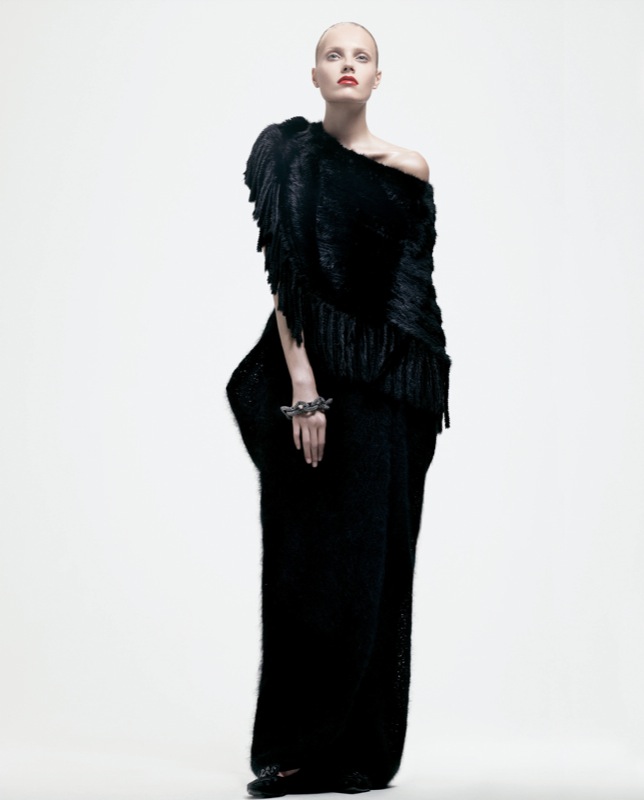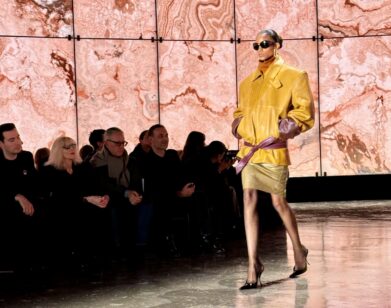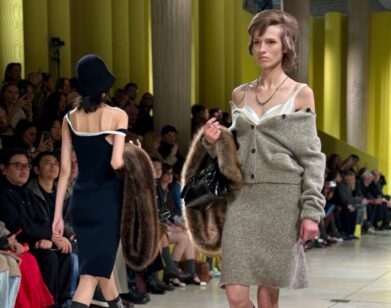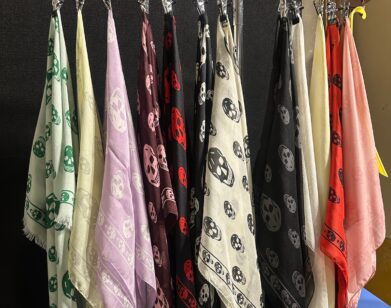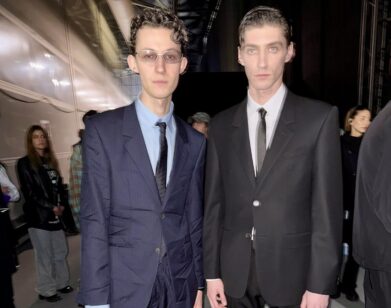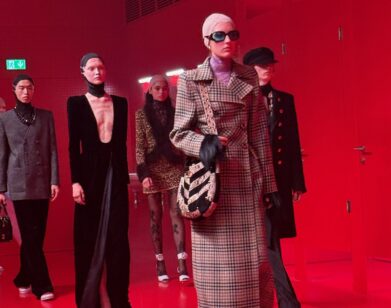Giorgio Armani
It’s not easy to get an interview with Mr. Giorgio Armani. He’s got protection. So to get him, we sent our Italian secret agent, Daniela Morera, who has been an important Interview contributor for half her life and happens to be a personal friend of the great designer. Daniela is irresistible. Here’s the proof-a great unauthorized Armani interview. And here’s Daniela . . .
Known as King George in the fashion world, Giorgio Armani deftly responds to business pressures while expanding his creativity. Past the 70-year mark (he’s now 74), he has the chiseled body of a young man, an empire worth more than a billion and a half euros, more than 5,000 employees worldwide, and hundreds of stores. He is the current president, chief executive officer, and sole shareholder of the company, founded in 1975. Today Giorgio Armani is far more than a fashion designer; he is a full-fledged lifestyle arbiter. His eyes, with amazing speed, continuously take focus, recording and quietly dissecting all they see. And for him, it all started with the pleasure of sight. Andy Warhol depicted him with uncommonly intense, clear blue eyes looking dead on at the camera. Although he and Andy had just met and were both shy and barely communicating, sharing no language his portrayal could not have been more accurate, capturing the very essence of Armani: clarity, elegance, discretion, integrity, and substance. Which means? Being true to himself. Andy located Armani’s talent in his gaze; in the power of vision of a man who worships the magic of images. Today the discrete charm of his fashion sensibility is expanding into new worlds, including accessories, perfumes, home furnishings, restaurants, flowers, hotels, resorts, and yachts. His gentle obsession, his fascination with aesthetics, knows no bounds.
Milan. September 10. Via Borgonuovo.
I was invited to dinner at Mr. Armani’s to watch the Italy-Georgia soccer match in his brand new home theater (Italy won, “even though we played badly,” I was told by my husband and Leo Dell’Orco, creative director of Emporio Armani Uomo). Armani had just returned from vacation. His schedule was packed tight and Milan Fashion Week was just around the corner. His press office had refused an appointment. Maybe next month? So I would try to “steal” an interview with him. I went prepared, slipping a tape recorder into my purse alongside my cell phone and lip gloss.
GIORGIO ARMANI: You’re terrible, but, all right, let’s do this interview. You were the one who did the first important interview of my life. We were in New York, on Fifth Avenue, on the terrace of my offices, doing a video for Andy Warhol. You came with your little crew. I didn’t understand exactly what video was then. Now I’m much better informed.
DANIELA MORERA: What wonderful times those were! Let’s start from there. You had become well known for your unconstructed jackets for the “career woman” look. I remember after that period, you said you would never need to help women feel strong again, because they had already become aware of their power. You looked for new solutions, refocusing the silhouette, changing direction. So what can we expect from your next collection?
ARMANI: In the beginning, I thought that women needed protection, on a style level, to have the right impact to let them realize their desire for success. Now, many years later, women no longer need a masculine uniform. Women have changed. My next collection will adapt my style to follow the liberation of women from their complexes about femininity and sensuality. I’ve toned down references to my past in accordance with changes in society, changing times. Recently, feminine exhibitionism has been excessive. I think that now we need a simplification, something cleaner, with neither exaggerations nor repressions. In colors, too, with some of all these frantic obsessions that I sometimes let influence me, I want to keep in mind that my clientele wants the Armani style and they want my colors. So a return to neutrals, but with variations.
MORERA: When you first caught the public’s attention, you began to transform fashion’s relationship to the body. Do you feel that your concept actually changed the way people look physically? Can fashion in clothing actually change the fashion of the human body?
ARMANI: I’ve changed the way people look, definitely. My success back then was also owed to career women who maybe had big legs or ample thighs, who felt well-protected by my fluid clothing that hid their flaws.
MORERA: I would go further and say you helped them psychologically.
ARMANI: My style changed their way of presenting themselves. At the time, everything was structured. There were wonderful Yves Saint Laurent suits that were quite stiff. I sensed that women wanted to be a little different. My fluidity gave them a way of interpreting their bodies in a more personal, individual way.
MORERA: Of course, your integrity is well known and one of the foundations of your success. It’s a natural obsession of yours. But what I’d like to explore is what I would call your gentle obsession, your aesthetic sense. Do you think of an outfit in terms of linearity, geometry, or movement?
ARMANI: In movement: I envision a woman entering a room. Aesthetics are part of me. I started to take care of my body after I turned 50. I never liked how I looked physically because I was too cute, short, with coloring only on my cheeks, the perfect little nose, and then the blue eyes. I was a hit with girls, who told me it was like I was in Technicolor. But I would have preferred to have the look of a tough guy from the wrong side of town – one of those fascinatingly ugly looks. One day I realized that I no longer had the mark of my waist, and then I understood that it was important to appreciate one’s body – not just from the perspective of its appearance – to take ownership of it, and recognize its vitality to be able to control it as well as you can and not be controlled by it. As the years pass, thinking that one day I will have to leave my body, my attachment to it becomes stronger rather than weaker. Anyhow, for about 10 years I’ve been learning to live with the idea that anything can happen at any moment. Perfectionism, absolutely. You have to have high expectations of yourself and those who work with you. Movies always fascinated me. They are an endless source of inspiration. There are countless images by great directors that made a profound impression on me, and I see film as a sublime example of teamwork. Anyhow, even though I have this home theater, I love going out to the movies. Movies are meant to be experienced together.
MORERA: I know you don’t like being asked this, but everyone has been waiting to hear for a long time what decisions Mr. Armani will make about the future. Is it very difficult to make a decision, even for someone as self-assured as you are?
ARMANI: For at least 15 years I have been asked, “What are you going to do about the future?” I have to admit that this is a bit embarrassing for me, even though I understand that it makes sense for the strategy of a business as large as mine. This problem that I hear, brought up every day now, is far from pleasant. This may be the real burden of my life that I have to bear right now. My fear? To have to make an urgent decision. I know that people who have been closely involved with my work for many years are terrified of having to answer to someone else, someone who is not me, and that it won’t be me to help them in their problems. This is my real problem.
MORERA: How do you handle it?
ARMANI: I am trying to optimize my ability, which still seems very acute to me, to manage this empire as if I were immortal for now, I should add.
MORERA: Now, you’re not just a fashion designer. You have expanded your worlds of exploration to accessories, home furnishings, hotels, resorts, restaurants, cafés, clubs, ultra-luxury jewelry and perfumes, flowers, and even yacht design. I know you do this with great pleasure, that it is a way of challenging yourself. But tell me the truth, how much is for your pleasure and how much is a business strategy?
ARMANI: It’s both, of course. My well-known aesthetic sense, which is so obvious and personal, spontaneously spurs me to challenge myself with different disciplines. Designing my most recent yacht, Main, was an enormous pleasure, though it was also very hard work. It was really exciting to play with unique materials and uncommon colors, experimenting with technology and so forth, in every last detail. The second I go into a restaurant or any place, I notice the space’s mistakes or if the lights or tablecloths should be changed. For example, tonight I came from the new shop that we will open in 10 days in Via Montenapoleone, and I immediately realized that the lights were wrong after the experts had been working on them for months. What is work for other people just comes to me naturally.
MORERA: Will you open the hotel in Dubai first and then the one in Milan [with Emaar Hotels & Resorts]?
ARMANI: Yes, Dubai in 2009 and Milan in 2010. I can’t wait to see the results of this incredible project: two spas, with five restaurants that are all completely different, from Japanese to Italian to Indian. And especially the contrast between my style and the world of Dubai, which is much more carnivalesque. At our hotel, there will be subtlety rather than grandeur. It is a giant project, but we ultimately did it with great simplicity. This infinite capacity of mine for designing, following through, and solving problems makes me think that I absolutely ought to do other things otherwise I’m wasting my time. Now, don’t laugh.
MORERA: Of course I’m laughing. You do so little! It seems that you are becoming more interested in the ultra-luxury market, which for you is not mass-market luxury.
ARMANI: I always want to do more, but of course there isn’t the time. I think that now it’s important for the public to get familiar with the Giorgio Armani name in all fields, because it has the right reverberation; it’s the right way to leave a mark on the future. Luxury is obviously the direction that interests me the most, but these days there is a lot of confusion between luxury and exhibitionism. For me, the concept of luxury is more traditional, more exclusive, more sophisticated than luxury for the masses.
MORERA: Has the time come to rethink certain aspects of the fashion world? What position do you take in mediating the direction society is taking?
ARMANI: We need once and for all to reconsider euphoria, extravagance, cynicism, vulgarity . . . Fashion is a very serious matter. The human body is something that I truly love, above all else. Of course, I don’t like women who follow fashion in the sense of becoming victims of it. I like women who have elegance, who have allure, who use fashion, rather than the other way around.
MORERA: You’re known as a workaholic, but fortunately you have recently started taking the luxury vacations. This year you took your new Main yacht and tooled around the Mediterranean, making up for lost time. Do you want to reward yourself by satisfying your desires a bit more? On the boat, we talked about how you should enjoy it all a little more.
ARMANI: I am rewarding myself, and I think I am also rewarding the people who are very close to me. When I go on my boat or to my vacation houses, where I still unfortunately spend very little time, I don’t go with the celebrities I know but with a close group of friends and people who have worked with me for a long time. I like to share my luxuries with them. One can learn to have fun, but I think it’s too late for me. I haven’t had fun in my life. I’ve always worked. I have always been too responsible. But I don’t know how to live any other way. I think that this discipline was also demanded of me by my work. I haven’t lived in the world, but, as you know, in a small circle of people who have been by my side in life and in work, and with very few friends.
MORERA: But since Richard Gere was in American Gigolo [1980], there is hardly a celebrity or personality that you haven’t socialized with. Just the other day I was looking at old photographs, and in a single picture you were next to Brad Pitt, Jennifer Aniston, Samuel L. Jackson, Ashley Judd, George Clooney, Adrien Brody, and Bono, all here at your house in Milan for dinner. Not to mention: Sophia Loren, Julia Roberts, Tina Turner, Martin Scorsese, Robert De Niro, who is also your partner in the Nobu restaurant [in Milan], Cate Blanchett, David Beckham, Paul Allen, and [French President] Nicolas Sarkozy, who recently awarded you with the Legion of Honor. You’ve received and met everyone.
ARMANI: Yes, but I don’t regularly socialize with important people, especially from my generation. I prefer being around young people. I don’t like situations from the past, definitely no nostalgia. I prefer to think of doing everything new with a different generation that has a different mentality.
MORERA: What about personal relationships? It is a classic fear that people want you for what you represent and not what you really are . . . but, well, love . . . We talked about it this summer too. We all need love. You can’t live on work and luxury alone.
ARMANI: Being famous very often means sacrificing your privacy and that of others. You have to impose on those close to you a pace and lifestyle that might be a bigger sacrifice for others than it is for you. I am aware of all of this. This is a very negative aspect for me. My strong sense of discipline has always been with me, and it also gave me the need for deep affection. I have never been satisfied with acquaintances who are superficial, volatile, or quick to change. I have surrounded myself with people with whom I am in total complicity. Of course I think that everyone has the right to fall in love at any age. But in life you have to learn how to control your emotions. You must know self-discipline.
MORERA: Have you learned a lot from your experiences with love?
ARMANI: I’ve learned a lot. When I was younger, I never laughed. I was always sour. If I look at pictures of me from the past, I never see a smile. I think it came out of my insecurity. I had a lot of complexes. The pain felt for the loss of loved ones, it all teaches you something and changes you. Now I have good armor, and I will keep on learning. But I don’t really want to dig too deeply inside myself. Some answers I don’t even want to look for. Better to leave certain things on the surface.
MORERA: When will you be back in Manhattan?
ARMANI: We’ll be back in Manhattan in February, for the opening of the new shop on Fifth Avenue. This space will be a new experiment, because for the first time the Giorgio Armani line will be in the same store with our other, more commercial lines.
MORERA: With all your products, you have created a lifestyle beyond just clothing. Is this your goal? Do you feel like you’re something beyond a fashion designer?
ARMANI: When people stop to ask me for an autograph, what I hear most often is, “Mr. Armani, you make beautiful things, but I like you so much as a person. You are so nice, so real.” That’s my reward.
MORERA: I have to say that seeing the crowd gather around you on beaches or on the street is an exhilarating and exhausting sight. I would like to make a documentary about this phenomenon. I always say that you are way too nice with people on the street. Always saying yes to hundreds of requests to be photographed with cell phones, hugged by sweaty fans. You never say no, even if you’re exhausted.
ARMANI: I always think, “Why should I say no to the last person? The first one, yes, and not her?” It would be unfair. I was born a regular person, the same as them.
MORERA: The Interview office in New York sent me a few questions: If you were a time traveler and could visit another time and place to immerse yourself in its style and culture, what would be the time and what would be the place?
ARMANI: I would have two preferences: Berlin in the ’30s and ancient Rome, where I would be someone with a very important role, if not an emperor.
MORERA: You have managed to stay current over decades. Many of your peers have taken a less active role, or even taken themselves out of the business, yet it’s hard for us to envision Armani without Giorgio Armani at the helm. Can you envision that?
ARMANI: It would be a big shock at first. People are used to knowing that Giorgio Armani is behind Armani Casa or Armani Privé products. The strategy is to get beyond this impasse and show that the idea of Giorgio can go on.
MORERA: During your time, what have been the most interesting moments for fashion, in general?
ARMANI: Japanese fashion, which created an amazing question: Can you dress us differently?
MORERA: The field of fashion has grown enormously in the last 20 years. The number of designers has multiplied remarkably. Do you think it affects what a designer has to do to get attention?
ARMANI: Success in the past was made up of small steps. Today success is dictated by multinationals and it is much faster. It seems to me that they say “Well done!” to things that aren’t real yet.
Armani is moving so fast that just to hear about his schedule can make one exhausted. While he is finishing the collection, exploring new possibilities, collaborating with new architects, expanding new lines and divisions, buying new companies, investing in new technologies and infrastructures, opening new retail spaces, planning the next trip, directing fashion shoots, receiving awards, talking to the captain of his unbelievable new yacht, Main (even Valentino, who went on board for a drink in Greece, said, “Quelle élégance!“), checking the drawings for the lamps for his new villa in Saint-Moritz, Switzerland, deciding on a new charity donation, dining in Milan at Nobu and checking out the crowd in the Privé club downstairs, and looking at the reports from his houses in Saint-Tropez, in France, Antigua, Forte dei Marmi, in Italy, New York, and Pantelleria, Italy, which has been his favorite house for the past 25 years, where he goes every summer. Located on the small island, southwest of Sicily, it’s not a house but more like a village, with a breathtaking view of the Mediterranean with nothing between his eyes and infinity. “Give me white sand and a palm tree and I’m happy,” I remember him saying a few weeks ago while he was relaxing on a cliff of black rocks. “Yes, but because you have all this and so much more,” I pressed him. “Of course, at my age, I don’t want to give up anything. I worked hard to earn it, but I had to give up a lot.” His eyes are clear yet inscrutable, and his emotions all the more so. After many years of experiences that have softened him, his sense of discretion is still rock solid. This is his great defense, his great strength, along with his integrity. Yet Giorgio Armani is the contradiction of Giorgio Armani. He is, at heart, a very human warrior.

